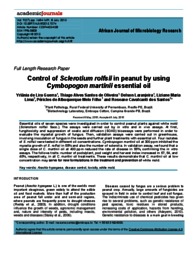Control of Sclerotium rolfsii in peanut by using Cymbopogon martinii essential oil.
Control of Sclerotium rolfsii in peanut by using Cymbopogon martinii essential oil.
Autoria: GUERRA, Y. DE L.; OLIVEIRA, T. A. S. DE; LARANJEIRA, D.; LIMA, L. M. de; MELO FILHO, P. DE A.; SANTOS, R. C. dos
Resumo: Essential oils of seven species were investigated in order to control peanut plants against white mold (Sclerotium rolfsii Sacc.). The assays were carried out by in vitro and in vivo assays. At first, fungitoxicity and suppression of oxalic acid diffusion (SOAD) bioassays were performed in order to evaluate the mycelial growth of fungus. Then, validation assays were carried out in greenhouse, involving inoculation of fungus in the seeds and further plant treatments with essential oil. Four isolates of S. rolfsii were tested in different oil concentrations. Cymbopogon martinii oil at 300 ppm inhibited the mycelia growth of S. rolfsii in 55% and also the number of sclerotia. In validation assay, we found that a single dose of C. martinii oil at 400 ppm reduced the rate of disease in 55%, confirming the in vitro assays. The follows traits: number of pods/plant, pod weight and harvest index increased in 57, 54, and 40%, respectively, in all C. martini oil treatments. These results demonstrate that C. martinii oil at low concentration may serve for new formulations in the treatment and prevention of white mold.
Ano de publicação: 2015
Tipo de publicação: Artigo de periódico
Unidade: Embrapa Algodão
Palavras-chave: Araschis hypogaea, Cymbopogon martini, Peanut, Sclerotium rolfsii, disease control
Observações
1 - Por padrão são exibidas publicações dos últimos 20 anos. Para encontrar publicações mais antigas, configure o filtro ano de publicação, colocando o ano a partir do qual você deseja encontrar publicações. O filtro está na coluna da esquerda na busca acima.
2 - Para ler algumas publicações da Embrapa (apenas as que estão em formato ePub), é necessário ter, no celular ou computador, um desses softwares gratuitos. Sistemas Android: Google Play Livros; IOS: iBooks; Windows e Linux: software Calibre.
Acesse outras publicações
Acesse a Base de Dados da Pesquisa Agropecuária (BDPA) para consultar o acervo completo das bibliotecas da Embrapa.

